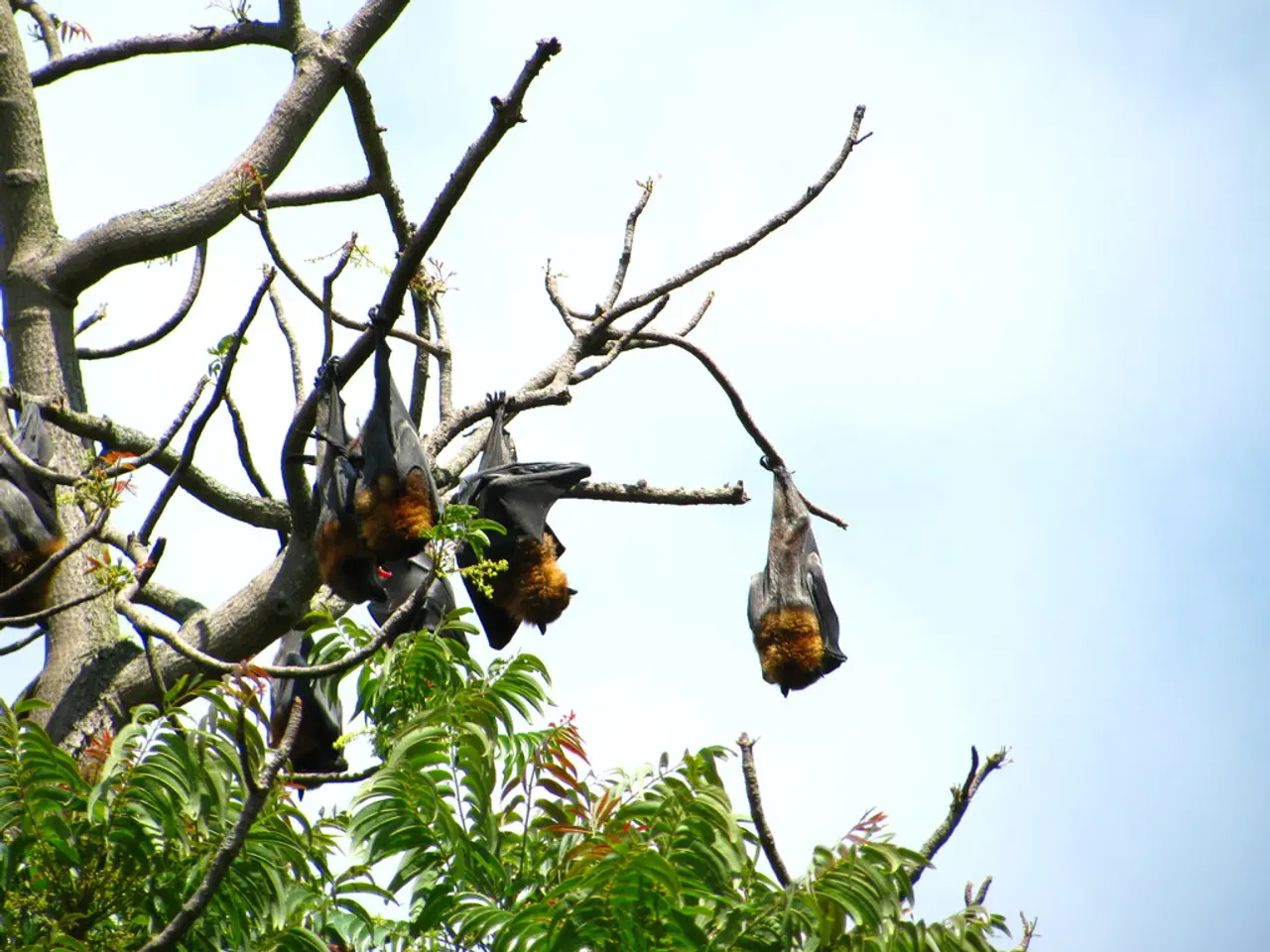Breaking News Nationwide:
Headline: Alert Issued for Possible Rabies Exposure in Grand Teton National Park Cabins
In the Grand Teton National Park, health officials are urging hundreds of people who may have been exposed to rabies in bat-infested cabins to seek medical attention and assess their risk. The affected cabins, located at Jackson Lake Lodge, have been closed since July 27, 2025, to address the bat infestation and prevent further exposure.
Identification of Rabies Exposure
Visitors who stayed in the affected cabins between May 15 and July 27, 2025, are advised to contact park or health officials to evaluate their exposure risk. Be aware that bat bites may be tiny and painless, possibly leaving no visible marks or bleeding. If you woke up and suspect you might have had contact with a bat, seek medical advice urgently for possible post-exposure treatment.
Health officials are contacting visitors who stayed in affected cabins to evaluate rabies risk and advise on post-exposure prophylaxis (rabies prevention treatment). They are also recommending prophylactic shots for people who fit certain criteria, such as deep sleepers who found a bat in their room, and children too young to say that they had seen a bat.
Prevention Measures
To prevent rabies exposure, avoid direct contact with bats, keep cabin doors and windows secured, and report any bat sightings or encounters to lodge management immediately. If you find a bat in your room, notify health officials promptly to evaluate potential exposure.
The cabins at Jackson Lake Lodge have been closed since July 27, with no plans to reopen. If you have stayed at any of these cabins recently and saw bats or suspect contact, it is critical to contact Grand Teton Lodge Company or local health authorities to assess your risk and receive guidance on rabies prevention treatment.
Rabies Risks and Prevalence
Bats are a frequent vector of the rabies virus. Health officials are reaching out to people in 38 states and seven countries through their respective health agencies and the U.S. Centers for Disease Control and Prevention. As of Friday, no bats found in the linked cabins at Jackson Lake Lodge have tested positive for rabies.
Brown bats, which were found in the affected cabins, can be either "little" or "big" species, with the larger ones more than twice as big. Brown bats typically live in colonies of 30 to 100 individuals. Devices fitted to the building are keeping bats from getting back in after flying out in pursuit of insects to eat.
Safety and Future Plans
The Wyoming Department of Health has no ongoing concern about visitor safety at the Jackson Lake Lodge area. There are no plans to exterminate the bats in the cabins at Jackson Lake Lodge. If symptoms of rabies occur (muscle aches, vomiting, itching), the disease is almost always fatal in humans.
Officials are unsure which species the dead bats were, but both "little" and "big" brown bats are common in Wyoming. The Wyoming State Health Officer, Dr. Alexia Harrist, believes that the handful of dead bats found and sent for testing are only a small sample of the likely dozens that colonized the attic above the cabins.
[1] CDC: Rabies Transmission Through Bats [2] Grand Teton National Park: Bat Exposure Alert [3] Wyoming Department of Health: Rabies [4] Grand Teton Lodge Company: Bat Exposure Alert
- Health officials are urging the public to take rabies policy seriously, especially when visiting Grand Teton National Park due to recent bat infestations.
- The park is taking necessary steps to ensure public health by closing affected cabins and addressing the bat issue.
- Science plays a crucial role in understanding rabies transmission, particularly through bats, with the CDC being a key resource for information.
- Public health agencies are actively reaching out to people who may have been exposed to rabies, including those in 38 states and seven countries.
- When staying in cabins, it's essential to practice workplace-wellness by securing doors and windows to prevent bat encounters.
- Medical-conditions related to chronic diseases, such as neurological disorders and cancer, can be exacerbated by rabies exposure.
- Respiratory conditions and digestive-health problems can also pose risks when individuals come into contact with bats.
- Eye-health, hearing, and skin-care should also be a concern as rabies can lead to various symptoms, including itching and skin conditions.
- Health-and-wellness, fitness-and-exercise, and mental-health are all interconnected; rabies exposure can negatively impact each aspect.
- Therapies-and-treatments for rabies are available, but seeking medical attention promptly is crucial to preventing the disease from progressing.
- Cardiovascular-health is vital for a strong immune system, which can help combat the effects of rabies.
- The industry of environmental-science is essential in understanding rabies prevalence in different habitats and helping control its spread.
- Climate-change may influence the behavior and population of bats, leading to higher chances of rabies exposure for people.
- Manufacturing industries must comply with health and safety regulations to prevent infectious diseases like rabies from spreading in the workplace.
- In the face of environmental challenges, the energy sector must prioritize clean and sustainable practices, potentially reducing the risk of rabies transmission.
- Mental-health is important for managing stress and anxiety related to rabies exposure risks or potential diagnoses.
- Skin-care regimens can help protect against rabies by avoiding contact with bats and washing exposed areas thoroughly.
- The finance industry can support health initiatives by investing in research, treatments, and prevention programs for rabies and other medical conditions.
- CBD products have been suggested as potential treatments for various medical-conditions, but their effectiveness for rabies is not yet proven.
- Neurological-disorders, which can result from rabies infection, can have long-term impacts on an individual's health and wellness.
- In order to combat rabies and other diseases, collaboration between public health officials, researchers, and the industry is essential.
- The environmental impact of rabies goes beyond human health; it can affect wildlife populations as well.
- Medicare can support individuals in obtaining necessary treatments for medical-conditions, including rabies.
- Smart home devices and gadgets can help monitor health and wellness, potentially alerting users to potential risks or issues related to rabies exposure.
- Automotive and aviation industries should prioritize safety measures to prevent accidents that could cause rabies exposure for passengers and workers.
- Small businesses should prioritize creating a workplace-wellness program, including training employees on how to handle potential rabies exposure.
- Real-estate investors should research areas with low rabies prevalence when considering new properties to develop or purchase.
- Stock-market investors should consider the potential impacts of rabies on various industries, such as healthcare, pharmaceuticals, and environmental conservation.
- Investing in wealth-management strategies can help individuals save, budget, and manage debt in the event of unexpected medical-conditions like rabies.








